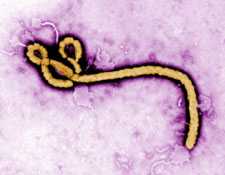EBOLA
NOTE: This page is archived for historical purposes and is no longer being maintained or updated.
The recommendations on this page are no longer in effect and will not be updated.

Overview
Ebola is a severe and often fatal disease in humans. It is also known as Ebola virus disease (EVD) and Ebola hemorrhagic fever. The 2014 Ebola outbreak is the largest Ebola outbreak in history and the first in West Africa. The U.S. Centers for Disease Control and Prevention (CDC) and partners are taking precautions to prevent the spread of Ebola within the United States. For current information about Ebola, visit the CDC Ebola webpage .
CDC has developed Ebola prevention and control recommendations for healthcare workers, laboratory workers, air medical transport, mortuary and funeral workers, and first responders such as firefighters, emergency medical technicians, and police officers. CDC has also developed guidance for airline workers, wastewater workers, and humanitarian workers.
CDC has also developed guidance for U.S. hospitals preparing for possible Ebola patients, including frontline healthcare facilities, Ebola assessment hospitals, and Ebola treatment centers. A list of current U.S. Ebola treatment centers is provided.
This page provides information about Ebola for employers and workers in healthcare and other industries. For additional information about workplace exposures, visit CDC Ebola web page
Ebola Information for Workers
Additional Resources
- Page last reviewed: October 30, 2014 (archived document)
- Content source:
- National Institute for Occupational Safety and Health Office of the Director


 ShareCompartir
ShareCompartir